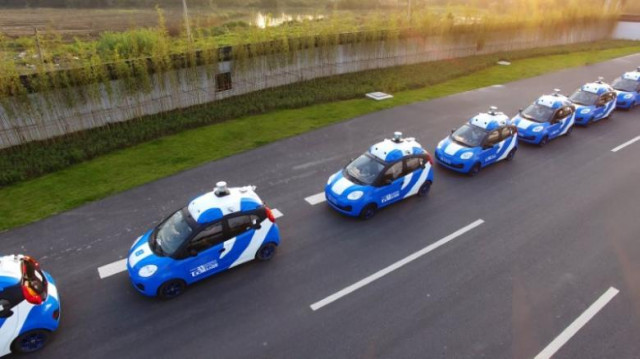China's Baidu taps 50 partners to help advance self-driving
Baidu has said its goal is to get self-driving vehicles on the road in China, possibly by 2019

FILE PHOTO: A fleet of vehicles equipped with Baidu’s autonomous driving technologies conduct road testing in Wuzhen, Zhejiang Province, China. PHOTO: REUTERS
The alliance includes partnerships with automakers, suppliers, startups, universities and local governments and is built around Baidu's Apollo self-driving platform, which was developed at its tech center in California's Silicon Valley. Apollo is aimed at Alphabet's Waymo self-driving package.
Baidu to launch self-driving car technology in July
Among the key development partners on Apollo are Nvidia Corp, which specialises in microprocessors and artificial intelligence, and mapping expert TomTom NV.
In mid-morning trade, Nvidia shares were up 2.6 per cent to $142.94 and Baidu US shares rose 2.3 per cent to $184.15. In Amsterdam, TomTom was up 3.2 per cent to 8.85 euros.
Ford Motor Co and Daimler AG also are partners, Baidu said, as well as supplier Delphi Automotive and chipmaker Intel Corp.
Baidu said at a briefing in Beijing it is partnering with five Chinese vehicle manufacturers, including Chery Automobile, BAIC Motor, FAW Group Corp, Chongqing Changan Automobile and Great Wall Motor. All but Great Wall are state-owned.
German suppliers Robert Bosch , Continental Automotive and ZF Friedrichshafen are also part of the alliance.
Baidu has said its goal is to get self-driving vehicles on the road in China, possibly by 2019, and eventually in other markets, including the United States.
TomTom, Baidu to collaborate on maps for computer-assisted driving
Baidu is an investor in Nio, a Silicon Valley electric vehicle startup also backed by China's Tencent Holdings and Lenovo. Nio hopes to put its first self-driving cars on US roads in 2020.
Two weeks ago, top officials from Baidu and Chery met in Silicon Valley to sign an agreement to collaborate on the development of intelligent, internet-connected vehicles, according to a source familiar with the companies' plans.
Chery has installed Baidu's self-driving software in several prototype cars in China and they could further deepen their relationship to include manufacturing.


















COMMENTS
Comments are moderated and generally will be posted if they are on-topic and not abusive.
For more information, please see our Comments FAQ